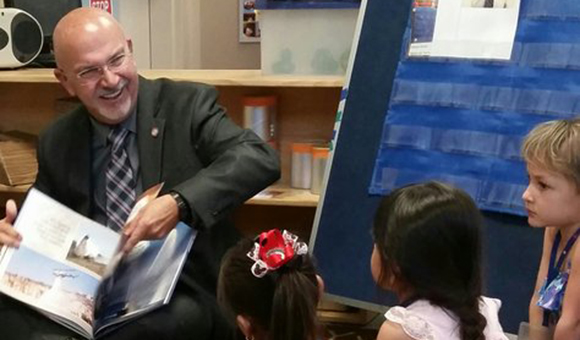
(Photo Credit: Victor Valley College)
As a teenager enlisting in the Air Force, Dr. Roger Wagner had no way of knowing that the California Community College system would be both one of the first stops along his career path and also his final professional destination. Like many of his peers, Dr. Wagner joined the military right out of high school to both serve his country and gain access to the higher education beyond his family’s means.
Stationed in the Philippines, Wagner enrolled in his first college courses and earned his associate degree from East Los Angeles College without ever having stepped foot in the Golden State.
That one choice launched a lifetime of service and leadership that led to his current post as the superintendent/president of Victor Valley College, where he strives to instill that service is central to leading and that everyone plays an important role.
Based on Robert Greenleaf’s book “Servant Leadership,” Dr. Wagner’s approach focuses on the growth and well being of the community and people in that community. Unlike more traditional leadership models, the “servant-leader shares power, puts the needs of others first and helps people develop and perform as highly as possible,” according to the Robert E. Greenleaf Center for Servant Leadership. Dr. Wagner has hosted talks on servant leadership and supports the model throughout Victor Valley College.
Dr. Wagner moved to California in 2007 to join Copper Mountain College as vice president for academic affairs. Though the California weather and Dr. Wagner’s love of motorcycles drew him westward from Missouri, it was the potential for growth within the sizable California Community College system that sealed the deal for him.
And he was right. Within a year was selected as Copper Mountain College’s superintendent/president. At the time, the college was struggling with a number of issues including state budget cuts, accreditation probation and a general lack of communication and rapport amongst colleagues. During his tenure, Dr. Wagner led a turn-around that resolved every one of those issues and also oversaw a number of campus improvements and building expansions.
Before coming to California, Dr. Wagner served 20 active years in the Air Force and taught at four different community colleges while on active duty. Over time, he earned his doctorate in educational leadership from the University of Nebraska, a master's in organizational management from the University of Phoenix, a bachelor's degree in social sciences from the University of the Philippines, in addition to his associate degree from East Los Angeles College.
After retirement from the Air Force, he took a position as director for training programs at a private prison. For three years, his responsibilities included managing the correctional facility’s staff training in workplace knowledge such as basic corrections, forced cell moves, incident containment and inmate behavior. He also oversaw inmate training programs such as GED prep, life skills and even bringing some community college courses to the inmates.
The students in both groups were very much like Dr. Wagner had been when he was active duty; they all had full time responsibilities and needed to fit their education in to an already full schedule. He learned that “if they weren’t engaged, they wouldn’t be truly successful,” a lesson he’s carried with him over the years.
His next move took him fully into the world of community college education as a private industry contract trainer at Crowder College in southwest Missouri. Before he’d completed a year in his role as an instructor, he accepted a position as the Director of Contract Training.
“Contract training fit very well with the program I’d done at the prison,” said Dr. Wagner. He moved up the ladder from there becoming Associate Dean of Instruction, then Dean of Economic Development and finally Dean of Career and Technical Education.
“It was all about training the labor force to meet economic and business needs,” he said. That’s a departure from the previous expectations of community colleges as being primarily about preparing transfer students for a four-year university.
“What’s happened in the last 25 years is an increase in how much community colleges are involved in job training and economic development,” Dr. Wagner said. “We are the ‘go-to’ organization when industry identifies a skills gap.”
Dr. Wagner sees the relationship between industry and community colleges strengthening over the coming years as they work together to develop career partnerships that provide workers with the skills the economy needs most.
His work at Victor Valley College follows that trajectory with a particular emphasis on servant leadership. Committed to strengthening the college and building a strong foundation before he retires, Dr. Wagner sees his ongoing tenure at Victor Valley College as “my last great challenge.”

